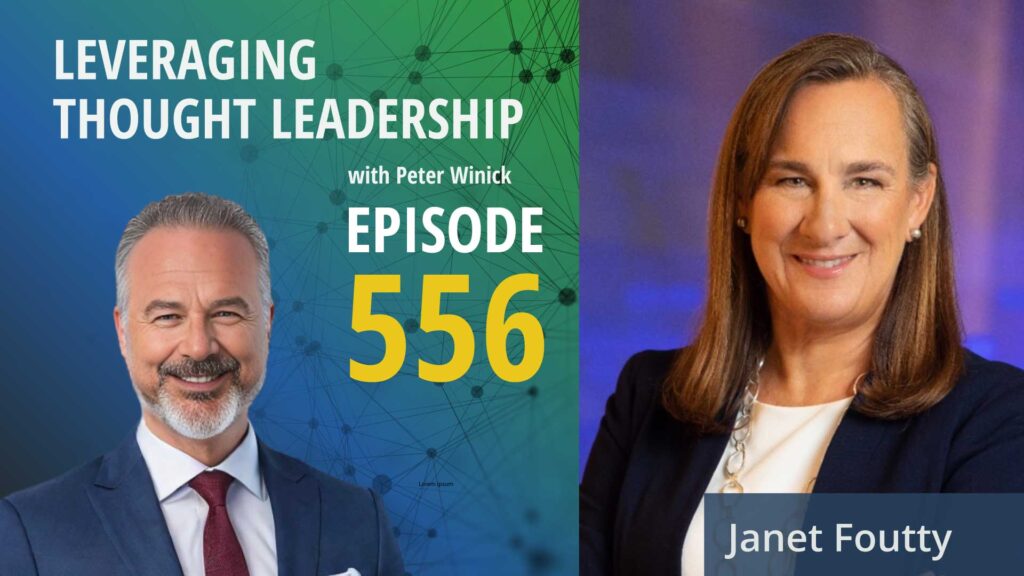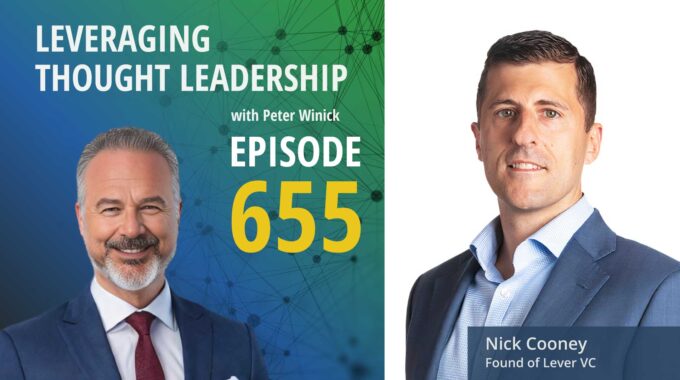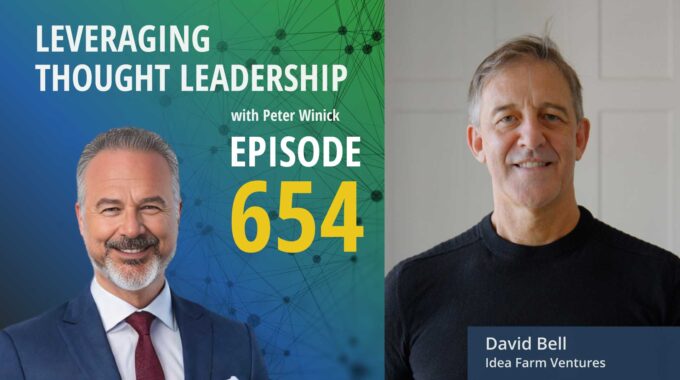How Strategic Content Fuels Growth in Purpose-Led Ventures This episode explores how thought leadership can…
Navigating Leadership: From Arrival to Thriving | Janet Foutty

Crafting Your Leadership Legacy
A conversation with Janet Foutty about going from corporate leadership to author on women’s leadership development.
In this episode, we welcome Janet Foutty, former Chair and Consulting CEO at Deloitte, and co-author of the insightful book “Arrive and Thrive: 7 Impactful Practices for Women Navigating Leadership.” Janet shares her journey from the corporate world to becoming a thought leader in women’s leadership development.
We delve into why, despite her demanding career at Deloitte, Janet chose to invest her time in developing thought leadership. Janet emphasizes that in professional services and consulting, thought leadership is crucial for staying ahead in the market and providing valuable insights to clients.
Janet reveals the inspiration behind “Arrive and Thrive” and how a collaboration with Simmons University sparked the idea. Together with Simmons’ president, Lynn Perry Wooten, they aimed to explore not just how women arrive in leadership positions, but also how they thrive once they get there. This concept of continual arrival and thriving resonates deeply in the careers of many women, prompting Janet and Lynn to craft a book that goes beyond their own experiences by incorporating insights from interviews with various professionals.
We uncover the process of testing ideas for the book, including reaching out to successful clients for their input. Despite initial apprehensions, Janet was overwhelmed by the positive responses, reinforcing the value of meaningful connections in professional circles.
With the book now published, Janet reflects on the impact it has had, sparking engaging conversations with women in leadership roles and even influencing discussions with men on leadership principles. The book has become a catalyst for diverse conversations and has expanded Janet’s outreach beyond her previous endeavors.
Join us as we explore the journey of leadership with Janet Foutty, from arrival to thriving, and discover the insights she’s gained along the way.
Three Key Takeaways:
- Developing thought leadership is necessary to stay ahead of market trends and to provide valuable insights to clients.
- Many thought leaders have valuable experiences they could incorporate into a book. However, by including the experiences of others you can validate and elevate your ideas.
- Maintaining a professional network of people you trust and who trust you in return can prove valuable far beyond the sales cycle.
If you need a strategy to bring your thought leadership to market, Thought Leadership Leverage can assist you! Contact us for more information. In addition, we can help you implement marketing, research, and sales. Let us help you so you can devote yourself to what you do best.

Transcript
Peter Winick And welcome, welcome, welcome. This is Peter Winick. I’m the founder and CEO at Thought Leadership Leverage. And you’re joining us on the podcast, which is Leveraging Thought Leadership. Today, my guest is Janet Foudy. She’s the coauthor of a book called Arrive and Thrive. And she was the CEO and chairperson for Deloitte Consulting. And during her tenure, she drew the business by $10 billion. That’s B billion. That would be what we call a big number. There’s lots more that I can say about her, but I’d rather talk to her than about her. So welcome aboard, Janet, thanks for coming.
Janet Foutty Peter, it’s so fun to be with you today. I’m really looking forward to the conversation.
Peter Winick Great. So you’ve had a very busy career, right? Primarily at Deloitte. Correct? When did you have time and then why did you make the time to develop thought leadership?
Janet Foutty So as you as you well know, and I’m sure listeners know in professional services and consulting, thought leadership is part of what we do every day because we have to be sort of out in front thinking about what’s happening in the market and what’s coming, and have smart things, talk to our clients about it. So sort of part of what I did along the way, but in terms of writing a book that is a and I’m happy to dig into that, that was not in my grad life plan whatsoever, but an interesting opportunity came up, which I frankly thought was not the best idea in the universe until I pushed my thinking a bit more and then was excited to lean into a topic that I thought needed some attention in the market.
Peter Winick So let’s talk about what. So how did you land on a topic? Because obviously, you know, of all industries, professional services, there is sort of an expectation that you have a perspective that you have a point of view and that you have a framework and a model. But that being said, there’s lots to choose from. How did you how did you dial in on what you dialed in and how did that get to be arrive and thrive?
Janet Foutty So when a long term collaboration between Simmons University, a small but very prestigious women’s college in Boston and Deloitte, was a long running relationship, there was a new president, Lynn Perry Wooten, coming in to Simmons, and our teams got together. And so it would be interesting if Janet and Lynn did something together. You know, she is one of the very few black women university presidents, very accomplished academic, Michigan and Cornell. Obviously not probably enough women sitting at the top of professional services firms. And we’re making good progress. They said you should write a book on women’s leadership. And I think we both thought, like, really? That’s what the book needs is another book on women’s leadership. And, it was I sort of somewhat begrudgingly probably that we even took the first conversation. But we have a lot of time and energy for our team. So we spent some time thinking about what would be a different conversation to have around women’s leadership and sort of where we landed. This is this idea not just of how do you get there, because there’s so much written around, how do you get there? But what’s there? How do you thrive? And then you layer on to that this idea that arriving and thriving is something that each of us that happens to each of us many times in our career, like in professional services, people say, oh, you become a partner, you’ve arrived. You’re done. Well, no, you continue to take a wide set of roles that push you in really different ways. And we’re in this constant cycle of re arriving and figuring out how to thrive in each step. So that was the genesis for the idea. The last quick thing I’ll say is we did decide we didn’t just want it to be us musing about the topic based on our, you know, I think, important experiences but limited. So we interviewed a lot of people, a lot of it, as you can imagine, being co-written by an academic is rooted in research. Yes. And then consulting me likes, lists and checklists and templates and tools. And so there’s plenty of those as well.
Peter Winick Right? Right. So, you know, I love that because there is a lot of literature. So this is an interesting piece in that oftentimes you know folks it well there’s sort of nothing new under the sun. It’s all been said. It’s all been said. And I don’t think that’s true. I think that’s kind of a lazy way out. So a lot of the work, rightfully so, has been on. How do you get there? Right. And if nobody’s talking about it. Okay. Well, now that we’re here now what? Because I think if you don’t thrive, you could either stagnate or burn out. Right? So it’s just as important, if not more important to thrive once in place. So that became sort of your market opportunity. What I wanted to ask is, is besides the integration of sort of the brain of a consultant and the rigor of an academic before it became a book, how did you test the ideas with clients and conversations and all that? Because I’m sure you didn’t just lock yourself in a room and say to your boss, okay, I’ll, I’ll be out in a year. I’m just going to do this. Leave me alone. Yeah.
Janet Foutty Definitely not, by the way, along the way, the pandemic started and I thought, okay, there’s no way that either of us is going to have her in particular, because you remember, you know, academia was probably in some ways some of the most disrupted by the pandemic. But she was super focused that we actually had a third coauthor who is terrific. She was a leadership coach, so she brought another balance to the conversation, and we really used the interviews for the book as a way to push our own thinking and validate our thinking. And so I had maybe one of the scariest moments I’ve had professionally, which was taking my Rolodex and deciding to write to some of my senior, most and most accomplished clients and asking them if they wanted to be part of a conversation about a book.
Peter Winick That was stay there a minute, because I, I love that statement, because in a lot of the work that we do with our clients, we’ll say to them at some point, okay, let’s do exactly that. Go through your Rolodex. Let’s find ten clients that you know that you love with that love you and try this out on them. And some of them will do anything, including voluntarily get a root canal doing that. And I’m like, wait, your partner at a professional service firm, you know how to sell. You’re not afraid to go out there. But I think there’s something very personal, scary when you go out with my idea, because then if they don’t like it, there’s a fear of, oh, so you don’t like me? Or you think I’m not smart, like whatever. Versus if it’s the model, the jure that the organization’s coming out with. So stay with that a little bit. How why that.
Janet Foutty So I think it is very vulnerable to say I’m going to put something and, you know, as much as a blog post on LinkedIn is of high value, I’m going to write a physical book and we’re going to want people to both buy this book, read this book, talk about this book, create book clubs around it. And it is a concept that I care about. It’s very personal. And, you know, senior people are very careful about where they lend their names. Yeah. Of course. So it’s not only personal about the ideas but personal about your own brand. Yeah. And so it was a very scary moment for sure. What we did was I put the initial note in writing because that was seemed a little less fearful than picking up the phone. And then I thought could get, you know, could get a quicker response. To be honest with you, I thought that many of them would be sent directly to a chief of staff or to, you know, to an assistant writer. And what the message basically said is we had this idea for writing about women thriving leadership. And we started thinking about the senior most executives. We actually found that it was interesting sort of across the spectrum of women leaders and men leaders. That’s another part of the conversation. And we said, we have these ideas of these seven practices, and we’d like you to pick a practice or two to talk to us about. And you can just write something up and send it to us, or we can do a more formal interview. And what shocked me, Peter, was that we got I think we sent 22 messages. We got yes responses to all of them and all but one wanted to do a live interview, and many of them said, I don’t want to just talk about 1 or 2 of these practices. I want to talk about all of them.
Peter Winick Right. So now stay, stay. So I love that they didn’t come back and say, this is the dumbest thing I ever saw. Right. Everybody jumped on it because there’s something, you know, vulnerable on your side, but on the recipient side, flattering as well to say, oh, Janet, trust me too. You know, she’s opened the kimono and she’s trusting me to be on the inside to share this idea that’s obviously important to her and all that. And it’s to some, you know, it’s, a privilege to be able to be part of that because I think a lot of times consultants forget that there’s a lot of folks out there that know you and love you, but it’s typically in the context of the engagement, the, you know, all that stuff. And we don’t get that personal. So I like I love that. How much richer or better however you would describe. Did the book turn out as a result of going through that interview process versus not.
Janet Foutty Night and day? Now, do I think my stories are great stories? Of course I do. Do I think the academic rigor is great? I do, but it’s funny when I and I’m, you know, we’re a little ways into this book being in the system, and I still get asked to speak about it quite a bit. And one of the things I do is I read a couple of the passages from the people that we interviewed because they are so powerful. And, you know, these senior executives came with such vulnerability into the conversation that some of their stories are just phenomenal reinforcements of these messages in these themes. And there’s a couple of passages in particular that I always read because they are so striking in terms of sort of reinforcing that and frankly, in some cases really refining the messaging either about an individual practice or about how all of them interweave together.
Peter Winick Love it. Love it.
Peter Winick If you’re enjoying this episode of Leveraging Thought Leadership, please make sure to subscribe. If you’d like to help spread the word about our podcast, please leave a five-star review at ratethispodcast.com/l t l and share it with your friends. We’re available on Apple Podcasts and on all major listening apps as well as at thoughtleadershipleverage.com/podcast.
Peter Winick So one other sort of question and with regard to the book is you’ve got three different authors. So I, you and I spoke a week or two ago and I said the only thing publishers hate more than two authors is three authors. Right. That only you have three authors, but it’s a bit unusual for three authors from three different entities, right? So it’s not like oftentimes, hey, this is a book from pick a consultancy. Right. And it right. Right. And the model is you know and the practice lead of that area will write the book and maybe they’ll get some internal help and blah blah blah. But there’s alignment around the passion in the content. But in terms of the business outcome and goals, I would think there’s different objectives amongst the three.
Janet Foutty 100%. So three. Three of us. New relationships. Very different professional paths. I mean, you think if you just look at an academic path versus a corporate path, it really don’t evolve into leadership in academia. So you’re much more tenured and not mean technically tenured till you’re much older in your career than you do in a corporate environment where you’re starting to lead, often at a very young age. A leadership coach coach comes it from a very different perspective, not probably having as much direct leadership experience, but having watched a wide variety of people. So we not only came from different organizations with some different intentions, but very different worldviews. However, the common thread is we all care deeply about leadership and deeply about women in leadership and building confidence for women to know they’re not in it alone and how to be better, stronger, and thrive more. So that was a that was a unifying force for the three of us, for sure.
Peter Winick Right. So now my next question is, okay, now what? So got the book. What’s next? Now what? What do you do now? Or maybe a better way to say okay, so what is the difference for you? Life pre and post being a quote published author. Obviously you have fans. You can’t go anywhere in public. You have security.
Janet Foutty Yeah, exactly. Exactly. You made millions in the book.
Peter Winick But other than that.
Janet Foutty Right. You know what’s interesting for me? So, you know, Lynn had has had multiple books published and is sort of comfortable with the writing process. I write a lot, but I hadn’t written a book so that the ability to say this is something that came from a spark of an idea, that turned into something that is in in the proverbial ether is a really powerful and sort of confidence building thing. And what I love is that we’ve not only, I think, created a really interesting discussion with senior women, which is where we intended the conversation to be. But I’ve gotten to spend time on campus. I’ve gotten to spend time with groups of women who are just starting their career. I’ve actually spent a lot of time with men on leadership principles that are in this book. So it’s created a very different and much broader set of people to be in conversation with and be in dialog with. Not to mention it just feels it’s it’s an important part of it and a different part of my category than I ever thought I would have had to be a published author. Now, I would say that other people probably put more stock in it than I do. Half the times I do my introduction, I don’t say right and I’m not sure of a book. You know, you and I have talked about, you know, those people who say they’re thought leaders aren’t necessarily the thought leaders, but I’m a person coming behind me and says, oh, don’t forget to talk about your book. So for me, it was an important thing to put into the system. I like to talk about leadership broadly, and it’s another mechanism to have those conversations. But and then having that other work as opposed to onto itself.
Peter Winick Yeah. And I was going to say, you know, there’s a humbleness to you where you’re not going out there saying, look at me, look at me. I’m, you know, I’m this rock star author. But it does in some ways open doors. Oh, right. 100% probably written, you know, the equivalent of 5 or 10 books during your career in terms of number of words. But nobody ever says, oh, remember that that deck you did back in 2003? Can you, can you does that offer me or can I get that in the Library of Congress? Right.
Janet Foutty Yeah, exactly. So yes. So opportunities, even though, you know, the book did not just come out to do fireside chats at off sites to do. Well, I could do but book clubs, you know, I could fill every day of every week of every month of every year just having book club conversations because the way the book is written, it’s a good book to use for our book club conversations. Then I like doing those, but there’s probably not enough and not enough hours in the day to do that. And so it continues to create. You’re absolutely right. A very different platform for conversations than all the things I’ve written for my clients and within my own organization.
Peter Winick Yep. Exactly. Cool. So we’ve talked a lot about how the process for you, the experience for you and the benefit for you. But when you put the book out, you were still at Deloitte, correct? Correct. So how happy would you say Deloitte was relative to what it did for the business?
Janet Foutty You know, I think it was very consistent with the Deloitte brand and I would say enhancing to the Deloitte brand, around leadership, around women, around thinking about equity, about practical. You know, some of the tools in the book are Deloitte tools. It’s a that’s all halo effect. But what I love the most was I spent lots of times a lot of client leaders in like the big place. Right. Largest private partnership in the world, largest professional services in the world. And the number of our client leaders who said, I bought copies of the book for my client, and it opened up a conversation with my client that I would not have been able to have. And so this idea that it is a gift, and we sort of had this idea that this book could be a gift. Now some people are giving it to their teenage daughters. I just literally got a note from a mom, someone I met at a client event who said, you know, I really want my mom to read this book and to have this book. So that’s all obviously very touching and lovely, beyond lovely. But the idea that my colleagues thought highly enough of this work to take this to their clients and say, the chair of our firm just published this book, and I think it’s something that you might like, and I’d like to have coffee and talk to you about it. It it was viewed as something that could be used for a business development conversation. For a personal conversation was maybe the thing that meant the most to me in terms of having it in the system. From a Deloitte point of view.
Peter Winick I would say that’s kind of a triple win. A it’s a win for you. It’s a win for the client, but also the partners and such that are able to use that as a vehicle to spark those. Because, you know, as consultants we need to stay in touch with our clients. But at some point you have something to say versus, oh, got any work here? Like what’s the next. So like, you know.
Janet Foutty It’s I love this thread. I don’t think I’ve ever had this conversation before, Peter, actually. So I love that you’re pushing me on this. I view as a leader in a professional services firm. My role is to do whatever I could to help my partners be as effective, as productive and, as fulfilled as possible. Right. And so part of that is I never thought about something that I thought about new offerings. I thought about efficiency in the business. I thought about how to support them, honestly, but I had not thought about something that I had written being something that would be helpful to them in a very personal moment with their clients. And so that to me is a great value that has come out of this process.
Peter Winick Yeah, yeah. And there’s no pun intended, but there’s a fairly long shelf life for books. Right. So the right consultant at the firm could be handing that book to the right client or potential client in a year or 3 or 5 from now, because you’re not writing about a piece of technology that it’ll have, it’ll be dated or, I don’t know, something in the, you know, are we lowering interest rates, are increasing interest rate. You know, it’s there’s an.
Janet Foutty Interesting because one of the things I grappled with was how to and I’m sure you’ve thought deep more deeply about this. And I have this how to talk about the pandemic. Yeah. And there’s a little bit but I just that reason I did not want this to be dominated by the pandemic impacts on women or women in leadership, because I believe that was more transient. Now, I think there are still some complex issues around the pandemic, don’t get me wrong, but I like the idea that it would be more evergreen.
Peter Winick Right? Because, I mean, there’s a lot of pandemic books that are almost already kind of a period piece, if you will, like. Oh yeah, the days when nobody know how to, you know, unmute on zoom. Okay, that was four years ago. If you still haven’t figured that out, right, you know, you got bigger issues. Well, this has been really lovely. I appreciate your time. I appreciate the transparency and the and the vulnerability, sort of the meta vulnerability of talking about being vulnerable, being vulnerable. So, good stuff.
Janet Foutty. Thank you so much. Great to be here with you. And I appreciate you continue to push us all to be better on how we have conversations about the things that are important to us.
Peter Winick Thank you. To learn more about Thought Leadership leverage, please visit our website at ThoughtLeadershipLeverage.com to reach me directly. Feel free to email me at Peter at ThoughtLeadershipLeverage.com, and please subscribe to Leveraging Thought Leadership on iTunes or your favorite podcast app to get your weekly episode automatically.





